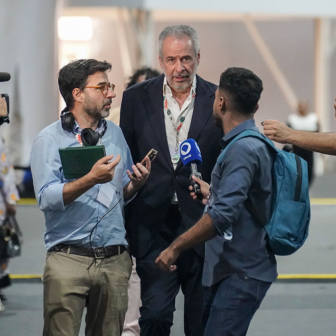The latest reports from the Intergovernmental Panel on Climate Change are predictably grim but in a sense irrelevant. The scientific debate over climate change has been over for some time, and the reality of climate change is now evident for anyone who chooses to look.
Until about five years ago, debates on climate policy lined up the extensive evidence of rising global temperatures and modelling showing worse to come against statistical quibbles and “sceptical” arguments that came down to the belief that “scientists are always predicting disaster but it never happens.”
In 2021, though, we no longer need to look at models to see the effects of climate change arriving faster and more destructively than most of the modellers thought possible. For Australians and many others around the world, climate change has taken the form of almost unstoppable bushfires. For those who have yet to feel climate change directly, the pandemic provides life experience of a long-predicted disaster that has turned out worse than most people imagined.
Even this direct experience has turned out not to matter much to some people. The fact that the New England area was devastated by fire in 2019 hasn’t shifted the denialist/do-nothingist position of its local MP, Barnaby Joyce, and probably won’t cost him his seat at the next election.
The same is true, in spades, of Covid. In the United States in particular, conservatives who have seen friends and relatives die around them continue to insist that the whole thing is a hoax. There’s now a whole genre of stories (reminiscent of deathbed conversion narratives) in which people dying of the disease finally urge their friends to get vaccinated or, occasionally, go to their graves still denying everything.
Despite all this resistance, we have collectively made enormous efforts to control Covid. For the most part, we have accepted handwashing, social distancing, masks, travel restrictions and periodic lockdowns even while being unsure which measures will work and which will turn out to be unnecessary. Now that vaccines have become available, the majority of the population has rushed to protect themselves and everyone else. And there is increasingly little patience for the selfish or misguided minority who refuse, even when given every opportunity to get vaccinated.
The contrast with climate change is striking. We know, from looking at successful examples, that we can greatly reduce greenhouse gas emissions at costs too small to be detectable in the aggregate economy.
By 2025, most European countries will have eliminated coal-fired electricity altogether; several have already done so. The main policy instrument used to achieve this goal has been an emissions trading scheme that requires firms burning coal, iron or gas to buy a tradeable permit. The permit price was below €10 per tonne for some years, but has now risen to €50. Since generating a megawatt-hour of electricity using coal emits roughly a tonne of carbon dioxide, the scheme effectively adds around A$80/MWh (or 8 cents/kWh) to the cost of coal-fired electricity, with a smaller effect on gas-fired electricity.
Since the emissions allowed under the EU scheme are currently around 1.5 billion tonnes, the annual value of permits used is roughly €75 billion, or around 0.5 per cent of the European Union’s GDP. This is not an economic loss; it is a transfer from polluters to society as a whole. The actual economic cost is even smaller.
The same point can be illustrated by Australian experience. The Gillard government’s short-lived carbon tax/price significantly reduced emissions. But despite Tony Abbott’s claims about a “wrecking ball” going through the economy, neither the imposition of the tax nor its removal had any measurable effect on GDP or other indicators of aggregate performance.
Ending coal is only a first step. But an extension of the same policies — a doubling of the EU carbon price, for example — would see a rapid replacement of gas-fired electricity with a combination of solar, wind, battery storage and other zero-carbon options. And even if the economic impact were quadrupled it would still be so small as to be undetectable against the background of ordinary economic fluctuations, let alone crises like the pandemic.
If the electricity supply were decarbonised, electrifying the vehicle fleet would eliminate emissions from road transport. Again, we have examples to show how easy this would be. Norway has committed to ending sales of internal combustion engines. Already, electric vehicles account for more than half of the country’s new car sales and around a fifth of the total car fleet. This outcome was achieved with a mix of fairly modest measures, such as exemptions from purchase taxes and parking fees. As the cost of electric vehicles has declined, some of the more generous measures have been scaled back.
A number of national governments have committed to ending sales of internal combustion engines, and car manufacturers have announced plans to switch to producing electric vehicles. But current policies will leave lots of petrol and diesel vehicles on the road well past 2040. Incentives on the scale of those being offered in Norway, combined with a hard deadline for removing internal combustion vehicles from the roads, if announced now, could put an end to transport-related emissions by 2035.
The main economic cost would be the scrapping of vehicles before the end of their usable life. But owners could be compensated with a version of the “cash for clunkers” scheme that ran in the United States a few years ago. This isn’t an elegant policy solution, but when we are faced with the prospect of destroying the global climate we can’t afford to worry about such things.
Other responses, including drastic limits on air travel, might seem more draconian. But we have all put up with near-total bans on international travel, and lots of constraints on domestic travel, imposed with little or no notice in response to pandemic outbreaks. Replacing business travel with Zoom has turned out to be easy. As for recreational travel, a very simple response would be to replace frequent short “getaways” with the longer holidays, taken once a year or less, that were normal in the twentieth century. This would allow trains to substitute for planes in many cases.
We have more time to act on climate than we did on Covid. But that time is running out, and we are not using it well. •




